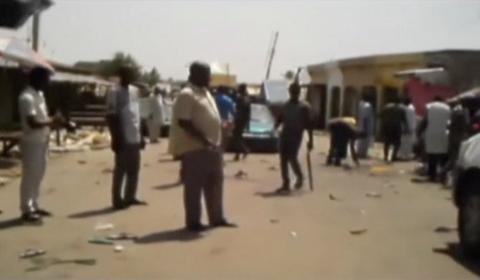Advertisement
Mosque blasts kill at least 27 in northeast Nigeria
YOLA, Nigeria (Reuters) - Explosions in and around a mosque in northeast Nigeria killed at least 27 people on Tuesday, a hospital official said, in the latest in a spate of attacks by militants in the region.
The blasts in the town of Mubi bore the hallmarks of Islamist militant group Boko Haram, which has waged an insurgency in Africa's most populous country since 2009 and often deploys suicide bombers in crowded places.
The jihadist group on Thursday carried out an attack in Maiduguri, capital of neighbouring Borno state, that killed four people.
More than 30,000 people have been killed in the insurgency, which has also forced some two million to flee their homes.
Abdullahi Yerima, police commissioner in Adamawa state, said a suicide bomber struck at the mosque at around 01:00 p.m. (1200 GMT) and a second bomber detonated a device some 200 metres (220 yards) away as worshippers fled.
Ezra Sakawa, chief medical director of Mubi general hospital, said 27 people died and 56 were injured.
Earlier police said about 24 people had been killed and more than a dozen were hurt.
Boko Haram held territory in Adamawa state in 2014 but troops pushed the insurgents out in early 2015 and Mubi was relatively peaceful until a suicide bomb attack in November 2017 that killed 50 people.
Insecurity has become a politically charged subject in the run-up to a national election next year. President Muhammadu Buhari, who took office in 2015 with a promise to end Boko Haram's push to create an Islamic state in the northeast, has said he wants to seek another term.
The bombings on Tuesday are the latest in a string of attacks in the northeast.
Mubi is around 200 kilometres (124 miles) away from Maiduguri where last week's attack was the second in a month. At least 15 people were killed and 83 injured when militants descended on the city in early April.
The government has said since December 2015 that Boko Haram has been defeated. But the insurgents have carried out a number of high profile attacks in the last few months, including the kidnap of 111 schoolgirls from the town of Dapchi and a strike in the town of Rann that killed three aid workers.
Nigeria's government in March said it was talks with Boko Haram, which split into two main factions in 2016, with the aim of securing a permanent ceasefire. It did not disclose details of the faction with which it had held discussions.
A map produced by the U.S. development agency in February and seen by Reuters shows Islamic State in West Africa, which split from Nigeria's Boko Haram, controls a swathe of territory in the states of Borno and Yobe which are next to Adamawa.
(Writing by Alexis Akwagyiram; editing by John Stonestreet and Peter Graff)



















Add new comment